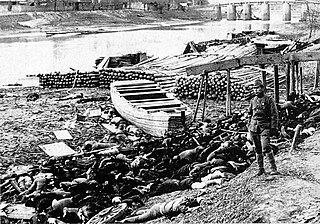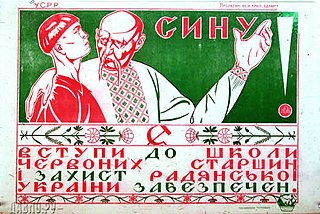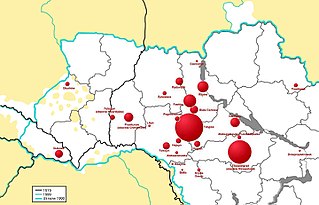
State terrorism refers to acts of terrorism which a state conducts against another state or against its own citizens.

A pogrom is a violent riot incited with the aim of massacring or expelling an ethnic or religious group, particularly Jews. The term entered the English language from Russian to describe 19th- and 20th-century attacks on Jews in the Russian Empire. Similar attacks against Jews which also occurred at other times and places retrospectively became known as pogroms. Sometimes the word is used to describe publicly sanctioned purgative attacks against non-Jewish groups. The characteristics of a pogrom vary widely, depending on the specific incident, at times leading to, or culminating in, massacres.
The Treaty of Berlin was a treaty signed on 24 April 1926 under which Germany and the Soviet Union pledged neutrality in the event of an attack on the other by a third party for five years. The treaty reaffirmed the German-Soviet Treaty of Rapallo (1922).

Korenizatsiia or korenization was an early policy of the Soviet Union for the integration of non-Russian nationalities into the governments of their specific Soviet republics. In the 1920s, the policy promoted representatives of the titular nation, and their national minorities, into the lower administrative levels of the local government, bureaucracy, and nomenklatura of their Soviet republics. The main idea of the korenizatsiia was to grow communist cadres for every nationality. In Russian, the term korenizatsiia derives from korennoe naselenie. The policy practically ended in the mid-1930s with the deportations of various nationalities.

Russian cosmism, also cosmism, is a philosophical and cultural movement that emerged in Russia at the turn of the 19th century, and again, at the beginning of the 20th century. At the beginning of the 20th century, there was a burst of scientific investigation into interplanetary travel, largely driven by fiction writers such as Jules Verne and H. G. Wells as well as philosophical movements like the Russian cosmism.

This is a timeline of Russian history, comprising important legal and territorial changes and political events in Russia and its predecessor states. To read about the background to these events, see History of Russia. See also the list of leaders of Russia.
Jewish Bolshevism, also Judeo–Bolshevism, is an antisemitic conspiracy theory that claims that the Russian Revolution of 1917 was a Jewish plot and that Jews controlled the Soviet Union and international communist movements, often in furtherance of a plan to destroy Western civilization. It was one of the main Nazi beliefs that served as an ideological justification for the German invasion of the Soviet Union and the Holocaust.

The Maxim–Tokarev was the first domestic Soviet light machine gun accepted for service. It was developed from the Maxim machine gun M1910 by Fedor Tokarev
The accusation that Joseph Stalin was antisemitic is much discussed by historians. Although part of a movement that included Jews and rejected antisemitism, he privately displayed a contemptuous attitude toward Jews on various occasions that were witnessed by his contemporaries, and are documented by historical sources. In 1939, he reversed Communist policy and began a cooperation with Nazi Germany that included the removal of high profile Jews from the Kremlin. As dictator of the Soviet Union, he promoted repressive policies that conspicuously impacted Jews shortly after World War II, especially during the anti-cosmopolitan campaign. At the time of his death, Stalin was planning an even larger campaign against Jews. According to his successor Nikita Khrushchev, Stalin was fomenting the doctors' plot as a pretext for further anti-Jewish repressions.
Mikhail Vasilyevich Sushkov (1775–1792) was a young Russian nobleman and writer of a small body of prose and poetry, notable for his autobiographical suicide novel. He committed suicide by hanging at age 16 after writing four suicide notes, one of which was to his uncle Alexander Khrapovitsky, at that moment personal secretary of empress Catherine the Great. Empress Catherine is said to have told Khrapovitskiy: "I am sorry for his parents, who lost such a fine son. But most of all I am sorry for himself. If he had stayed alive, he soon would have outshone Voltaire". Sushkov’s suicide notes, the report on his death by the Moscow police, and reactions by contemporaries, not only document the suicide in great detail, but give a rare close-up of a phenomenon that was seen as a highly significant ‘sign of the time’.
The 75th Guards Rifle Division was a Red Army infantry division during World War II and afterwards, which later became the 75th Guards Tank Division and was finally disbanded in the 1990s.

Crime in Russia refers to the multivalent issues of organized crime, extensive political and police corruption, and all aspects of criminality at play in Russia. Violent crime in Siberia is much more apparent than in Western Russia.

Count Lev Nikolayevich Tolstoy, usually referred to in English as Leo Tolstoy, was a Russian writer who is regarded as one of the greatest authors of all time. He received nominations for the Nobel Prize in Literature every year from 1902 to 1906 and for the Nobel Peace Prize in 1901, 1902, and 1909; the fact that he never won is a major controversy.
The anti-Jewish violence in Central and Eastern Europe following the retreat of Nazi German occupational forces and the arrival of the Soviet Red Army – during the latter stages of World War II – was linked in part to postwar anarchy and economic chaos exacerbated by the Stalinist policies imposed across the territories of expanded Soviet republics and new satellite countries. The anti-semitic attacks had become frequent in Soviet towns ravaged by war; at the marketplaces, in depleted stores, in schools, and even at state enterprises. Protest letters were sent to Moscow from numerous Russian, Ukrainian and Belarusian towns by the Jewish Anti-Fascist Committee involved in documenting the Holocaust.
Viktor Dotsenko is a Russian author. The author of a series of action/adventure novels featuring Savely Govorkov, Dotsenko has often appeared on best-seller lists and was one of the best-selling authors in Russia in the 1990s. According to 2007's Literature, History and Identity in Post-Soviet Russia, Dotsenko's thrillers of the 1990s bore patriotic and anti-Western themes. 2007's Literary Russia: A Guide credits him, alongside Alexandra Marinina, with pioneering the thriller genre in Russia.

VolfMoiseevich Bronner (1876–1939) was a Russian Empire and Soviet physician, venereologist, and anti-syphilis campaigner who founded the State Venereological Institute in Moscow of which he became the director.

The Yenisei electoral district was a constituency created for the 1917 Russian Constituent Assembly election. The electoral district covered the Yenisei Governorate. Moreover, the Russian citizens living in the Uryankhay Kray formed part of the constituency.
The 121st Rifle Division was an infantry division of the Red Army during World War II.

The 1988 violence in Shusha and Stepanakert was the expulsion of the ethnic Armenian population of Shusha and the ethnic Azerbaijani population of Stepanakert, in the Nagorno-Karabakh Autonomous Oblast in the Azerbaijani SSR, Soviet Union, from September 18 to 20, 1988. During the violence, 33 Armenians and 16 Azerbaijanis were wounded, more than 30 houses hed been set on fire, and a 61-year-old Armenian was killed. At the end of the violence, 3,117 ethnic Azerbaijanis were forced to leave Stepanakert.

The pogroms during the Russian Civil War were a wave of mass murders of Jews, primarily in Ukraine, during the Russian Civil War. In the years 1918–1920, there were 1,500 pogroms in over 1,300 localities, in which up to 250,000 were murdered. All armed forces operating in Ukraine were involved in the killings, in particular the anti-Communist Ukrainian People's Army and Armed Forces of South Russia. It is estimated that more than a million people were affected by material losses, 50,000 to 300,000 children were orphaned, and half a million were driven out from or fled their homes.












